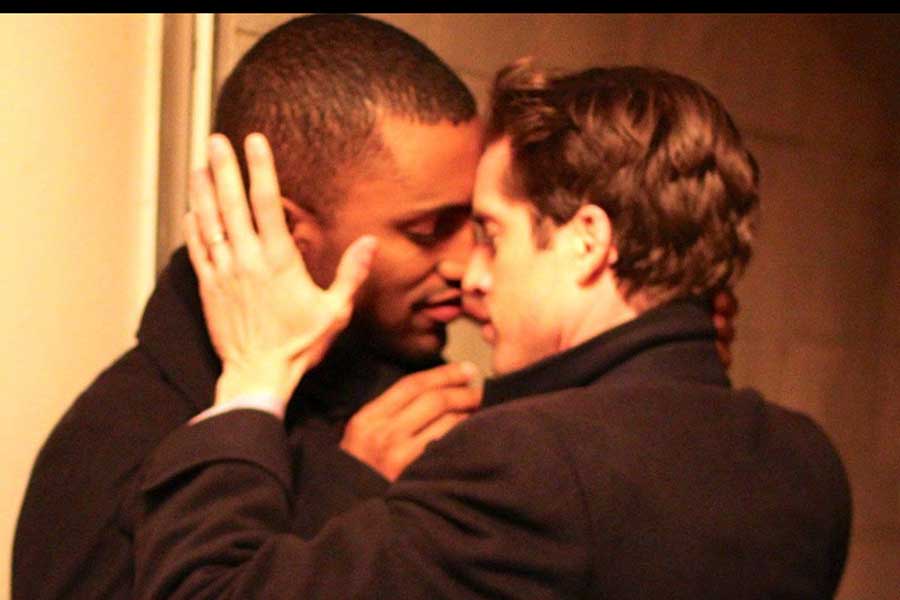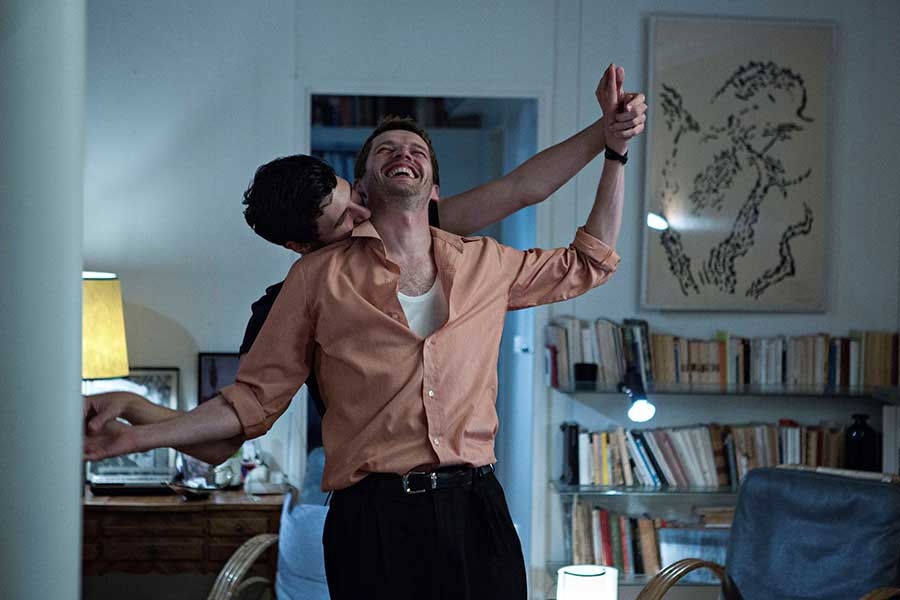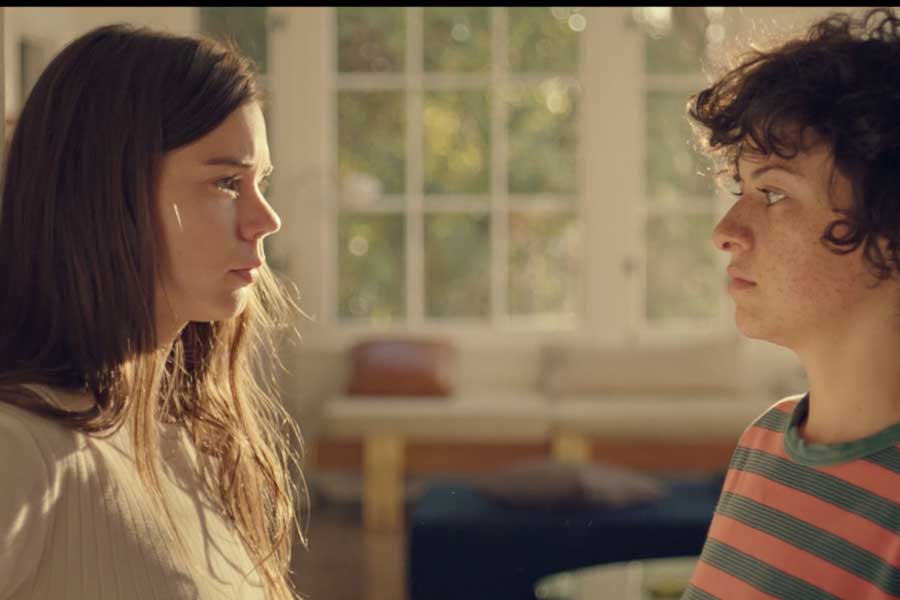With Valentine’s Day approaching, sometimes a romantic dinner and a movie can be best enjoyed at home. With all the DVD, VOD and streaming options on Netflix, Hulu and Amazon Prime, there are millions of options. Here are a half dozen LGBT films to consider cuddling up with on Valentine’s Day.

Darryl Stephens (left) with Scott Bailey (right) in “From Zero to I Love You.”
“From Zero to I Love You” (available on Amazon streaming) is a glossy drama set and shot in Philadelphia. Written and directed by Doug Spearman, this film has the married-with-kids Jack Dickinson (Scott Bailey) unexpectedly falling for Pete Logsdon (Darryl Stephens). Their relationship, which includes sex on the down low, comes to the expected head when Pete wants Jack to leave his wife Karla (Keili Lefkovitz). If the plot veers into soapy melodrama, Spearman includes some poignant moments — from an intriguing scene with Jack in a pool in Palm Springs to a heart-to-heart Pete has with his father (Richard Lawson). There’s even a fairy dust motif. (It’s corny, but it works). Stephens is irresistible, giving a relaxed, assured performance. “From Zero to I Love You” may wear its heartfelt emotions on its sleeve, but it does induce smiles.

Lean into the offbeat rhythms of out gay writer and director Christophe Honoré’s sophisticated “Sorry Angel” (on Netflix) and absorb all its romantic splendor. This intimate, affecting drama, set in 1993, alternates between Jacques (Pierre Deladonchamps), an HIV+ writer in Paris, and Arthur (Vincent Lacoste), a Breton. Jacques is 35 and cynical, while Arthur is 22 and sentimental — so of course, they belong together. As the protagonists slowly give in to their longing, Honoré’s elliptical narrative approach keeps the men apart for much of the film to detail their lives and other relationships. But that helps viewers become invested in the guys coupling up. This strategy creates the magic of Honoré’s film, a melancholic romance that is often swoon-inducing.

In “Duck Butter,” (on Netflix) bisexual actress Alia Shawkat — who also co-wrote and produced — plays an actress named Naima, who meets a woman singer named Sergio (Laia Costa) at a lesbian bar one night. Sergio asks Naima to dance, and the possibility of romance hangs in the air. After the women connect deeply and spend most of the rest of the night together, Sergio asks Naima to impulsively spend the next 24 hours with her drinking juice and having sex every hour. Naima begs off, but circumstances prompt her to return the next day and act on Sergio’s proposition. The film’s rambling, episodic nature both works for the story and against it. As Naima and Sergio learn more about each other, some viewers will be riveted by the way the power shifts between the young women. Others, however, may be exhausted from their 24-hour experiment.
“Adam,” (on DVD) is trans director Rhys Ernst’s shrewd romantic comedy-drama about a lie that gets out of hand. The title character (Nicholas Alexander) is a cisgender, heterosexual and virginal 18-year-old man. Spending the summer of 2006 in New York City with his older, lesbian sister Casey (Margaret Qualley), Adam attends parties and rallies that expose him to a vibrant queer and trans world. It is at one event where Adam meets Gillian (Bobbi Salvör Menuez), a lesbian to whom he is attracted. Adam does not initially correct Gillian when she assumes that he is transgender. As their relationship blossoms, however, Adam struggles with his deception — and things get complicated when they attend an S&M-themed party, or when Gillian wants to have sex with a strap-on. If “Adam” sounds like an insensitive comedy, out lesbian writer Ariel Schrag, adapting her novel, is quite clever in how she addresses the issue of gender and sexuality. Gillian has an interesting and important backstory, as do other key supporting characters, such as Ethan (the scene-stealing Leo Sheng), one of Casey’s roommates who befriends Adam. This is a smart, enjoyable teen film for the genderqueer crowd.

The terrific romance from Kenya, “Rafiki” (“Friend”) (on DVD and streaming), was outlawed in its home nation for “promoting lesbianism,” but this humble film really addresses homophobia. Kena (Samantha Mugatsia) is a tomboy who falls for Ziki (Sheila Munyiva) — which is unheard of in their town, where their fathers also are political rivals. The young women make a pact not to be “like everyone else;” they want to be “something real.” They talk and kiss and cuddle, but they have a spat while attending a sermon on same-sex marriage. When their relationship is discovered, things come to a head. Can Kena and Ziki live openly, or even be together? It’s essential to see the marvelous “Rafiki” to find out.
“Orpheus’ Song,” (on DVD) directed by Tor Iben starts as a bromance between Philipp (Sascha Weingarten), and Enis (Julien Lickert). These handsome guys, workout buddies in Berlin, are both ostensibly straight. One day Philipp wins a trip to Corfu and takes Enis along. They splash in the Mediterranean, and hang out in their hotel, where Philipp gets into some trouble with another guest. When they take a trip to Paleokastritsa, things start to become strained between them. The guys get lost and fight. They meet Hercules (Henry Morales) and learn about a bewitched pomegranate. Eventually, they end up naked and entwined in one another’s arms on a beach. “Orpheus’ Song” generates most of its sexual tension waiting for the guys to hook up, and most of its dramatic tension after they do — will the guys stay together, or even stay friends? Weingarten and Lickert are both attractive and look good sans clothes. If Iben’s film is short (70 minutes) and slight (not too much happens), it is still quite satisfying.

